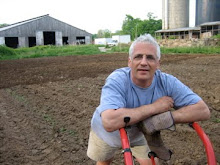We need a new vision for saving our old farms
By BEN GREENFIELD
Publication: The Day
Last spring, as business became bleaker than a grizzly bear's stare, I learned to stare back. Seeking greener pastures, I borrowed a field from a farmer, planted crops, learned to tell time by the sun, and feel the rhythm of the field. As the plants flourished, I started a blog, and wrote about my love for this new field of farming.
I've had the good fortune to meet many farmers, folks who live in the same homes their grandparents built, who grew up working in barns with the occasional lowing of 150 milking cows. Their barns are now mostly empty, assets faded to liabilities. That grizzly bear's been staring at many farming families for a long time. For some, their only hope is to sell the farm so a developer can transform it into two-acre subdivisions.
It's now autumn and my field is anything but still. About 150 Brandywine, Beefsteak, Roma and cherry tomatoes are still producing fruit. As the days grow shorter, and the sun's angle shifts, the honey and bumblebees are frantic, impatient with barren blooms. Soon the air will be dry and cold; snow will cover the newly-harrowed field. I wonder why the people, who for generations have fed us, must sacrifice their sacred land to simply retire?
Perhaps they don't.
I propose the formation of a "Farming Community Foundation of Eastern Connecticut."
The experience that I enjoyed in my host farmer's field should not be limited to entrepreneurs and those who inherit farms. Everyone should have access to this honest life, connected to their food, environment and community.
Three essential goals should guide any foundation farming project undertaken:
• Save a farm.
• Create a farming community.
• Grow a business.
Lately, I have shared this vision with experienced farmers and scholars. Forming friendships and relationships with organizations and institutions, including the American Farmland Trust, Yale School of Forestry and Environmental Studies, and Stone Barns Center for Food & Agriculture, has provided greater insight into the problems, and opportunities, that await us in farm country.
The days of multi-generational farming families are mostly gone, with a few brilliant exceptions, such as the Jones Family Farm in Shelton, Lyman Orchards, and Bishops Orchards.
The not-for-profit foundation I propose would seek out medium-sized to large farms. Farms, or adjoining farms with 250 acres to 600 acres, provide adequate land to create a small, village-setting of about 40 acres to 60 acres.
In this manner, we can defray the cost of land acquisition and improvements, while being able to provide affordable homes for the folks who will then perform the bulk of the work on the farm. After all, over one-half of the occupations tracked by the Connecticut Department of Labor cannot afford a typical two-bedroom apartment. We'd like our professional farm workers to have the option of living where they work. Farm products would be marketed within the region.
Building should keep with the farm's historic origins, placing 85 percent to 90 percent of farmland into trust and possibly reselling the remaining development rights to ensure the land stays agricultural.
People will want to visit these farm communities, which could offer internships, volunteer, educational and social opportunities, weddings and authentic farm dinners.
This is, indeed, an ambitious agenda. For those of us who enjoy a close community, good neighbors, and fast sledding hills, farming communities could become popular options over suburban sprawl and starter castles.
Of course, this is a dream or, maybe, a genuine vision. It will not happen at once, and when it does happen, it may take a somewhat different direction.
But in the post-bailout economy, when so many who depended on the accelerating expansion of our economy are now adrift, it feels like the right approach at the right time. So I will keep talking to experts and interested supporters and doubters, hopefully learning from all of them and moving forward into a novel sense of place and community.
Feel free to get involved. As I've learned over the season, a simple seed sown can change a life.
Ben Greenfield has worked in food product development and marketing for more than 30 years. His fascination with farms sparked in 1992, while visiting potato growers during the creation and birth of the company he founded, Mystic Chips. Greenfield turned his interest to the idea of creating farming communities after he sold his potato chip brand. Contact Greenfield atBengreenfield@Mac.com or follow his progress atwww.Somecountryforoldben.blogspot.com.
 COMMENTS ( 0 )
COMMENTS ( 0 )


Hi Ben
ReplyDeleteI hope that you find much support for this powerful idea for saving our farmlands and a way of life that shouldn't be allowed to disappear. I was born and raised in the area of Connecticut you speak of and still return regularly. I hate seeing the land and the activities that we all took part in disappear. Working farms I used to visit as a child were not there for me to show my children and this is a big loss for them.
Good luck in your endeavors.
Kathryn Oat Grey
Thanks, Katy!!! Please let me know if you and your friends would like to get involved>
ReplyDeleteBen